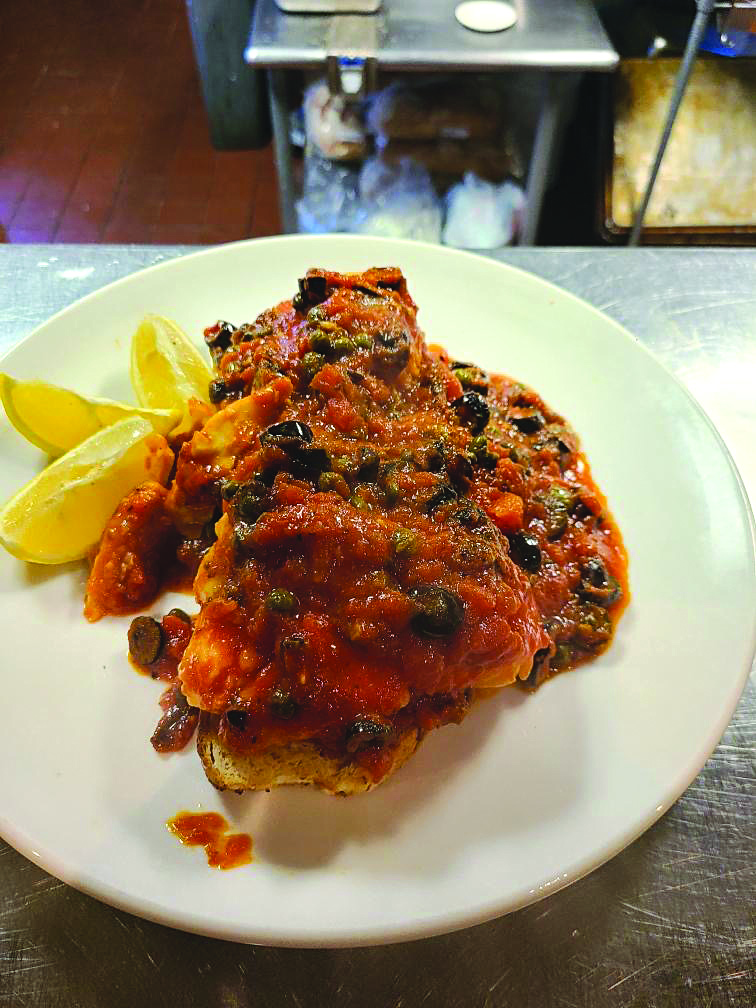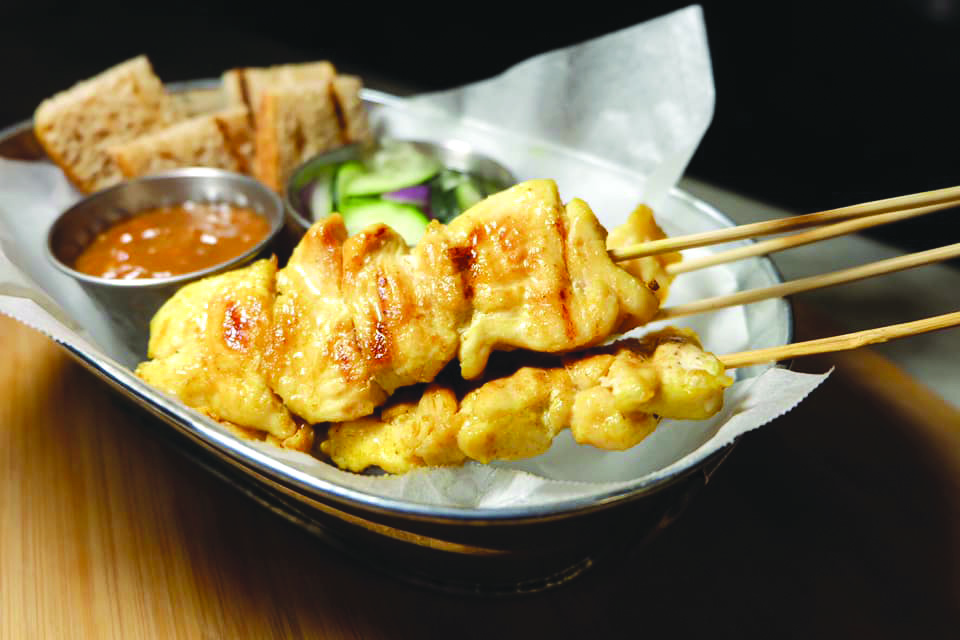A look at the holiday indulgence that is the Yule log
Growing up in Québec, Nathalie Hirte of Litchfield doesn’t remember a Christmas when her mother, Agnès Boucher, didn’t make bûche de Noël, more commonly known here as a Yule log. The chocolate sponge cake, rolled with a jam or buttercream filling and decorated to look like the wood from an actual tree log, was the centerpiece of her family’s kitchen table at dessert.
“She would cut out the edges from the pan, and I remember I always looked forward to getting to eat those crunchy sides, because she wouldn’t use those to roll the log,” said Hirte, now the office manager of the Franco-American Centre in Manchester and the founder of “Franco Foods,” a virtual recipe swap she started earlier this year. “She always made meringue mushrooms to put on top of the cake, and she had this very small plastic Santa Claus on skis. She’d put it on with powdered sugar to make it look like he was skiing down the log.”
While Hirte’s mother most commonly used strawberry or raspberry jam as a Yule log filling, you can use everything from a chocolate or vanilla buttercream to a salted caramel or peanut butter mousse. The variations continue when it’s time to give your cake its own festive decorations.
The result may look fancy, but with the right baking ingredients and tools a Yule log may not be as daunting to make as you might think. Local restaurateurs and baking experts discuss some of their own tips and tricks for whipping up this classic holiday dessert.
Baked in tradition
The precise origin of baking a cake around the holidays to resemble a log is unclear, but Pembroke chef Debbie Burritt, owner of Sweet Crunch Bakeshop & Catering Co., said it may be linked to a long-standing custom in France and other European countries of burning a “Yule log,” or a large tree log, in one’s fireplace on Christmas Eve. Keeping the ashes from the burnt log was thought to bring good luck for the year ahead.
Baking your Yule log cake starts with a basic mixture of eggs, sugar, flour, melted butter, heated milk and baking powder, poured over a prepared sheet pan. Hirte said she likes to butter her pan and then line it with parchment paper before adding the batter. The exact baking time may vary depending on the oven, but it’s generally pretty quick — around 15 minutes, she said.
“You want to be careful not to overbake,” she said. “I’ve found that using a bigger pan … has cooked faster but also rolled better. … You can touch the middle of it and if it’s moist and bouncy then you know it’s ready.”
Because the cake itself is very light and airy, the trickiest part of the Yule log is in the rolling. Denise Nickerson of The Bakeshop on Kelley Street in Manchester said that it should be rolled warm as soon as it’s out of the oven to prevent it from cracking. You can use parchment paper or a small kitchen towel dusted with confectioner’s sugar to carefully roll it before letting it rest for several minutes.
“Once it’s cool, you can unroll it carefully and then spread your filling, because [the parchment paper or towel] kind of trains it to be easily rolled back up again,” she said.
Filled with variation
Whether you’re using a jelly or jam, or a buttercream icing or mousse, the filling flavor inside of your Yule log will be up to your own personal preference. Simply spread out your filling of choice across the cake while it’s laying flat, then gently roll it once again.
Burritt has filled all kinds of order requests in the past, from a chocolate Yule log with vanilla buttercream to pumpkin or peppermint-flavored Yule logs.
“You can start with any basic variation of a sponge cake and turn it into a Yule log by changing the buttercream inside, or the cake itself,” she said.
Hirte said she still likes to make hers the way her mother did, with a strawberry or raspberry jam, but she’s tried other fillings over the years, like a salted caramel mousse.
Popovers on the Square in Epping and Portsmouth also makes its Yule logs with a raspberry jam filling, general manager Matthew Clark said, while at Just Like Mom’s Pastries in Weare, owner and baker Karen Car will make a vanilla sponge cake filled with chocolate mousse on the inside.
In addition to those with chocolate, Nickerson has also taken orders for “birch” Yule logs, which feature vanilla buttercream inside a vanilla cake, made to look like a paper birch tree.
“When we roll ours up we like to leave the ends exposed rather than covering it with frosting, so you can see the swirl, which looks like the rings of the log,” she said.
In Henniker, pastry chef Aaron Mallory of The Grazing Room at the Colby Hill Inn has been serving Yule logs for two as a dessert option on its Christmas Cheer menu, with a hazelnut filling and a chocolate ganache covering.
Time to decorate
Once your Yule log is baked and rolled, the final step is to decorate it to your liking. It’s a good idea to let the rolled cake cool completely, Hirte said, even waiting until the next day if you can, to make sure it is firm and any icing you use as decorative tree bark will not melt.
Lightly running the tip of a fork or a spatula through the frosting is an effective way to manipulate the texture, giving the cake some rough edges that look like tree bark, Nickerson said. You can also cut off a small sliver of the cake from one of the ends and place it against the side of the bigger piece to make it look like the smaller branch of a tree.
“You can dust it with confectioner’s sugar for snow,” Nickerson said. “We also have poinsettias we put on ours that are made out of gum paste.”
Other garnishes to give your Yule log a woodsy look involve adding meringue “mushrooms” dusted with cocoa powder, or holly leaves with sugared cranberries for added color.
Where to get Yule logs
While the deadline to order a Yule log for the holidays has passed for most bake shops in New Hampshire, there is still time to get one at one of these local eateries.
• The Bakeshop on Kelley Street (171 Kelley St., Manchester, 624-3500, thebakeshoponkelleystreet.com) will have a limited amount of Yule logs available for sale, on Thursday, Dec. 24, from 7:30 a.m. to 1 p.m., owner Denise Nickerson said.
• Colby Hill Inn (33 The Oaks, Henniker, 428-3281, colbyhillinn.com) is serving Yule logs for two as a dessert option on its Christmas Cheer menu. According to chief innovation officer Jeff Brechbühl, the menu will continue to be available for a few days after Christmas, on Dec. 26, Dec. 27 and Dec. 30.
• Frederick’s Pastries (109 Route 101A, Amherst, 882-7725; 25 S. River Road, Bedford, 647-2253; pastry.net) offers a dark chocolate Yule log filled with a light chocolate orange mousse, available to order now through New Year’s.
Agnès Boucher’s bûche de Noël (Yule log)
Courtesy of Nathalie Hirte of the Franco-American Centre in Manchester
3 eggs
1 cup sugar
1 teaspoon vanilla
1¼ cups all-purpose flour
2 teaspoons baking powder
¼ cup milk
1 tablespoon melted butter
Preheat the oven to 400 degrees. Prepare the baking pan by buttering its surface and adding wax paper or parchment paper. Butter the surface of the paper and dust with flour. Beat the eggs in a deep bowl. Add the sugar, ¼ cup at a time. Make sure it is incorporated into the batter before adding more. Add the vanilla. In a separate bowl, mix the flour and the baking powder. Heat the milk (do not let it boil), then add melted butter. Fold the dry ingredients into the egg mixture. Add the hot milk and stir gently, to not deflate the mixture, until the liquid is absorbed. Pour onto the prepared cookie sheet. Bake for about 15 minutes, until it is lightly golden (the cake should be baked throughout, but still moist).
While the cake is baking, prepare a clean towel for rolling. Sift some powdered sugar onto the towel, or use some parchment paper, to help ensure the cake does not stick to it. Take the cake out of the oven. While the cake is still hot, trim off the edges (they will be hard and crunchy). Turn out the cake onto the prepared towel. If it’s still on, remove the paper from the back. Roll the cake quickly with the towel and let it rest, towel and all, for 15 minutes.
Unroll and spread your choice of filling (jelly, jam, buttercream icing, etc.) and roll once again. It will look like a large Swiss roll. Let the rolled cake cool completely. Add any decorations of choice (optional: cutting off a piece to put on top of the cake can give it the look of a cut off tree branch). Cover everything with the icing, spreading it to make it look like bark. You can use a fork or a spatula to add texture. After decorating, display as the centerpiece of your Christmas dessert table.
Featured photo: Raspberry jam and dark chocolate mousse filled Yule log. Courtesy of Popovers on the Square in Epping and Portsmouth.








